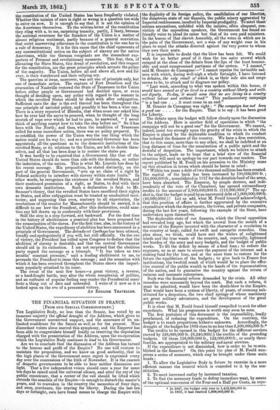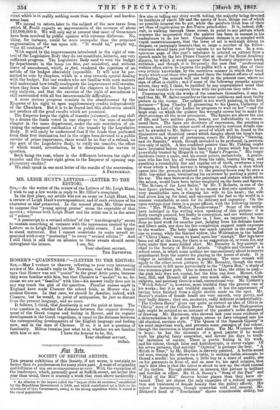THE FINANCIAL SITUATION IN FRANCE.
[FROM OUR SPECIAL CORRESPONDENT.]
THE Legislative Body, no less than the Senate, has voted by an immense majority the official draught of the Address, which gives to the Government unreserved support, and the assurance of its un- limited confidence for the future as well as for the present. Nine discordant voices alone marred this symphony, and the Emperor has been able to congratulate himself loudly on receiving the deputation charged with the presentation of the Address, upon the co-operation which the Legislative Body continues to lend to his Government.
Are we to conclude that the discussion of the Address has turned to the honour and profit of the Empire? No one will venture to maintain the proposition, and we know on good authority, that in the high places of the Government more regret is expressed every day over the concessions of the 24th of November. It is the essence of despotic governments to be able to bear neither discussion nor light. That a few independent voices should once a year for some ten days be raised amid the universal silence, and utter the cry of the public conscience, that a corner of the veil should be lifted which shrouds the scandals of the Empire—is enough to disturb the master's peace, and to reawaken in the country the memories of freer days, and soon, perchance, the craving for liberty. During the last ten days or fortnight, men have found means to charge the Empire with the duplicity of its foreign policy, the annihilation of our liberties, the disastrous state of our finances, the public misery aggravated by Imperial recklessness, insulted by Imperial prodigality. To meet these solemn accusations, unfolded with the incisive, often eloquent, con- viction of the opposition speakers, the Government has found no friendly voice to plead its cause but that of its own paid ministers. In the bosom of that slavish Assembly, all the votes in which are in the palm of the Government, not a man of any weight rose in his place to repel the attacks directed against the very power to whom they owe their seats. It is impossible to doubt that the blow has been felt. We could wish for no better proof of it than the too naive avowal which escaped at the close of the debate from the lips of the least honour- able and most compromised partizans of the system. "I cannot," said M. Granier de Cassagnac—" I cannot repress the invincible sad- ness with which, daring well-nigh a whole fortnight, I have listened to debates, the on41 result of which is, as their sole aim and scope seems to be, to attack and to 'disgrace our policy. "Last week, according to what was spoken within this house, it would have seemed as if we lived in a country without liberty and with- out dignity. To-day, it would seem that we are living in a country without labour and without bread." This parliamentary campaign "is a bad one . . . it must come to an end."
M. Granier de Cassagnac was right : "The campaign has not been a good one . . . . for the Empire. That is to say : it has been good for Liberty.
The debate upon the budget will follow closely upon the discussion of the Address. Here is another field of operations in which "the campaign will not be a good one" for the Government. We cannot, -- indeed, insist too strongly upon the gravity of the crisis in which the Empire is placed by the deplorable condition to which its conduct has reduced the finances of the country. We have a firm conviction, that to this cause, more than to any other, we shall be indebted at no long distance of time for the resurrection of a public spirit and the downfal of despotism. The importance, which we believe to attach to the subject, leads us to hope that a brief view of the financial situation will need no apology on our part towards our readers. The report published by M. Fould on his accession to the Ministry sums up this situation in terms which should be borne in mind : "Within ten years a debt of two thousand millions has been created. The capital of the bank has been increased by 100,000,000 fr. ; 135,000,000 fr., consolidated in 1817 for the dotation fund of the army, have been absorbed. The Emperor, by simple decrees, and inde- pendently of the vote of the Chambers, has o ened extraordinary credits to the amount of 2,800,000,000 fr. (112,111,000/.)" The up- shot is, that the budget is paid byan uncovered debt of 1,000,000,000 fr. (40,000,0001.) ! Let us add, what M. Fould himself acknowledged, that this position of affairs is further aggravated by the excessive expenditure which the departments, the towns, and private companies, during the last few years, following the example of the State, have undertaken upon themselves.
The deplorable state of our finances, which the liberal opposition had revealed long ago, but which the avowal from the mouth of a minister of the Empire invested with the character of a revelation to the country at large, called, for swift and energetic remedies. One plan alone, we think, could have met the wishes of enlightened minds and the true wants of the country, and, especially, lightened the burden of the army and navy budgets, and the budget of public works. To fill the deficit by means of a final loan; to reduce the expenses, so as at once to secure the payment of the interest and a sinking fund for the loan, and at the same time to restore for the future the equilibrium of the budgets ; to give back to France free institutions, the twofold result of which would be to place the effec- tive control of the public wealth in the hands of the representatives of .the nation, and to guarantee the country against the return of ruinous and insensate enterprises. Such was the financial reform demanded by the crisis. All other remedies were necessarily, beyond the mark. But such a reform, it must be admitted, would have been the death-blow to the Empire. That would have been a system of liberty, of peace, of economy sub- stituted for a despotism, the two chief springs of whose machinery are great military adventures, and the development of the great public works.
It is clear that M. Fould found himself compelled to seek for other expedients. What his programme is worth may soon be seen. The first postulate of this document is the impossibility, loudly proclaimed, of reducing the expenditure. On the contrary, the budget is to reach proportions hitherto unknown. Accordingly, the draught of the budget for 1863 rises to no less than 2,500,000,000 fr.*
The credits to be opened in this budget for the different services exceed by 156,000,000 fr. (6,240,0000 the credits of the preceding budgets. Of these 156,000,000 fr., 122,000,000 fr., or nearly three- fourths, are appropriated to the military, and naval services.
If the expenditure is not diminished, how is order to be re-esta- blished in the finances? On this point the plan of M. Fould com- prises a series of measures, which may be brought under three main heads : 1. To allow the Legislative Body in future to exercise in a more efficient manner the control which in conceded to it by the con- stitution.
2. To meet increased outlay by increased taxation. 3. To find the necessary funds to defray immediate want, by means of the optional conversion of the Four and a Half per Cents, an expe-
• In 1847, the budget only rose to 1,452,000,000 fr. In 1862, it had reached 1,808,000,000 fr.
dient which is in reality nothing more than a disguised and burden- some loan.
We intend to return later to the subject of the new taxes from which M. Fould expects an augmentation of the revenue of about 122.000,000 fr. We will only say at present that most of these taxes have been received by public opinion with extreme disfavour. No- thing, for instance, could he more unpopular than the proposed augmentation of the tax upon salt. "It would be," people say, "the 45 centimes."*
With regard to the improvements introduced in the right of con- trol of the Legislative Body they do not constitute, hitherto, any very sufficient progress. The Legislative Body used to vote the budget by departments in the lump (en bloc,, par fairsistZre), and without leave of amendment, which, in fact, rendered the rejection of an article of the budget absolutely impossible. It will now be per- mitted to vote by chapters, which is a step towards special dealing with the budget. But our readers who are familiar with such matters will understand how totally inadequate the improvement still remains, when they leant that the number of the chapters in the budget is only sixty-six, and that the exercise of the right of amendment is still, surrounded with all but insurmountable difficulties.
A. more serious progress consists in the abandonment by the Emperor of his right to open supplementary credits independently of the Chambers. But it is to be feared lest this abdication, should not produce all the good results which are promised.
The Emperor keeps the rights of transfer (vireogent), and may shift by a decree the funds voted in one chapter to the uses of another chapter in the same department, under the sole restriction of ob- taining the cubseguent ratification of the transfer by the Legislative Body. It will easily be understood that if the funds thus purloined from their first destination had in the origin been devoted to a public service of prime importance, there would be no fear of a refusal, on the part of the Legislative Body, to ratify the transfer, the effect of which would, nevertheless, be to disorganize the service in question.
Such being the ease, where is the difference between the right of transfer and the former right given to the Emperor of opening sup- plementary credits? We shall speak in our next letter of the results of the conversion. A Fassienusar.































 Previous page
Previous page